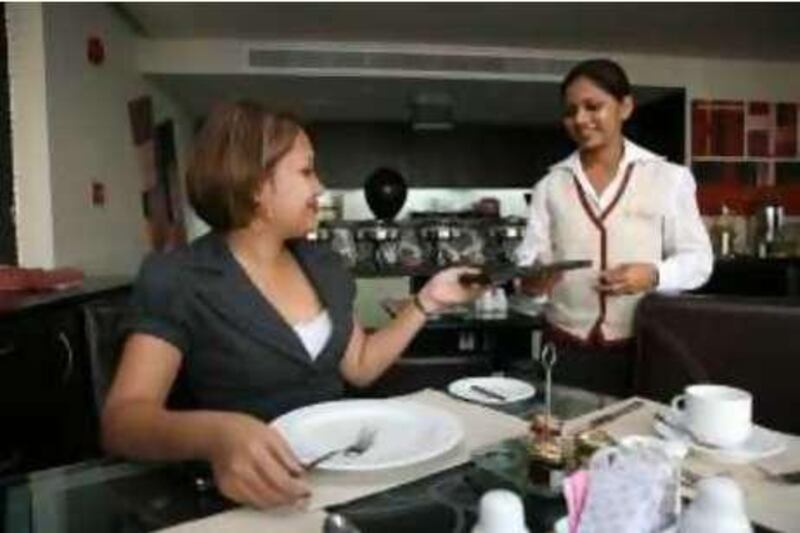Some people consider tipping to be a form of etiquette, but most workers in the service industry depend on the kindness of strangers to make ends meet. I had never thought about the merits of tipping until I heard Rahmat Allah Mir's story. Mr Mir, 55, a taxi driver from Peshawar in north-east Pakistan, has been driving a cab in Abu Dhabi for 15 years. During our ride we chatted about the financial difficulties he faced. He recalled the day he received a telephone call from his wife while out on his rounds.
"My wife told me that our youngest child was very ill and needed to have her appendix removed," he said. He had barely managed to save because his living expenses almost always matched his salary, and any money left over he sent back home to his family. Now his daughter needed immediate medical attention and his situation was dire. He said he went out on another shift later that night hoping for a miracle. "I picked up an American passenger who wanted to go to the airport. Little did I know that God had sent him to give me a Dh150 (US$40) tip, which really made a difference with the hospital bill," he said.
At the end of our conversation, Mr Mir told me: "We really do depend on the tips from our passengers. It's our children's bread and butter. Without tips here, I would rather move back to Peshawar." Saleh al Harbi, a retired Emirati, says he understands the importance of tipping. "I always give a generous tip to waiters, cab drivers and anyone who helps me out," he said. "I know that people working in the service and hospitality fields don't get paid very well and need my tip."
Tips are typically calculated as a percentage of the cost of a transaction before taxes and may vary among different cultures and service industries. In the case of taxi drivers here, it is straightforward. Drivers expect passengers to pay a minimum tip of rounding up the fare to the next highest dirham. For example, if the fare is Dh5.25 the driver would expect to be given Dh6. "But usually what happens is that a passenger will give us one to three dirhams extra on the fare inside Abu Dhabi, and if I drive to Dubai I would expect to get at least 10 per cent of the total fare," said Kaber Mangaliappali, who also drives a cab in the capital.
Yet some people believe tipping is unnecessary. "I don't tip cab drivers because they have a fixed rate which customers are expected to pay, and why should I pay them more for doing their job?" said Zelda, a resident working in the telecommunications field who chose to withhold her last name. However, it seems that most passengers believe taxi drivers are lowly paid and have no qualms about handing over a few extra dirhams.
When it comes to tipping in hotel restaurants and bars, however, confusion is often the byword. Fine print at the bottom of menus or bills in Abu Dhabi states that charges amounting to 16 per cent are added to all transactions, including the cost of a room. Some people believe that a portion of this tax goes to the workers. "This 16 per cent charge does not include tips," said Alka Patel, the public relations manager at the Fairmont Hotel in Dubai. "Ten per cent goes to the hotel as a service charge, while the remaining six per cent is a government tax."
Hotels are considered part of the tourist industry and taxes paid to the Government are taken from this service charge. "Giving a tip to the waiters, bellboys or housekeeping staff is left to the discretion of the guest," said Elena Chentsova, the revenue manager at the Emirates Palace hotel in Abu Dhabi. "We don't offer guests any guidelines whether to tip or not; if they want to they may, but if not that's acceptable also."
In many cases, tipping can result in better service. "Tips do motivate me to work harder," said a waiter at a Costa Coffee shop in Abu Dhabi. "In order for things to be fair at the end of each day we divide the total tips among all the staff in the shop equally, which works out to be about Dh150" per person, he said. Whether you tip as a sign of appreciation or in an attempt to get better service from the waiter or housekeeper, remember that many people are actually counting on your kindness.
? At the airport, tip the porter about Dh5 per bag, and more if your luggage is particularly heavy. ? When you valet park, give the attendant Dh10 to Dh20 as you leave. ? Food deliverymen expect about Dh5 to Dh10, depending on how big the order is. ? Tip housekeepers about Dh25 every time they clean your house. ? Hairdressers expect between Dh10 to Dh20. If your trip to the salon includes a cut and blow dry, leave Dh20, and perhaps more depending on the quality of service. ? In restaurants, always make sure you leave at least a 10 per cent tip. If the service is exceptionally good, you can tip as much as 20 per cent - or more if you're feeling generous.
? If you deal with government employees, be aware that tipping them is seen as a bribe, so don't reward the person who processes your driver licence. ? Never tip the owner of a restaurant, as they would consider it an insult. Save the gratuity for the servers. abakr@thenational.ae






